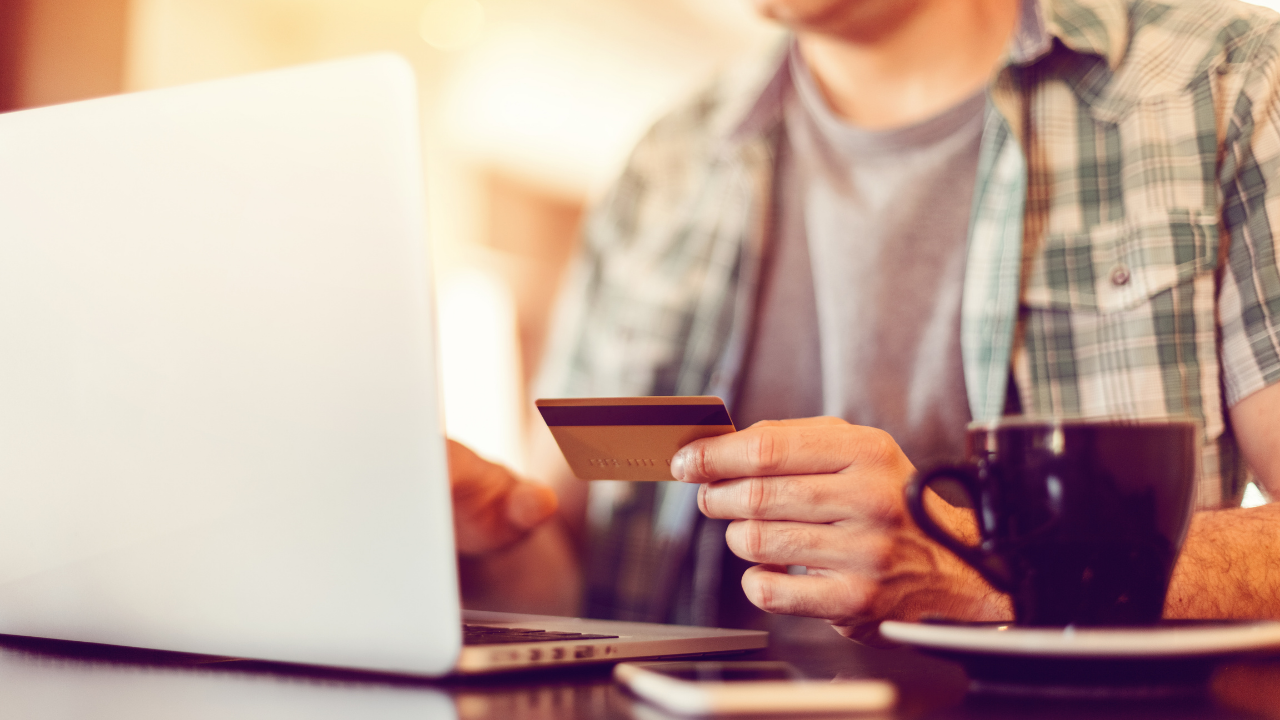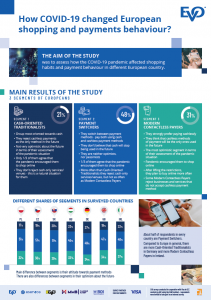
08 Sep Europeans more inclined to pay with cash alternatives – eagerly awaiting end of pandemic
Experiences surrounding the Covid-19 pandemic have made Europeans more inclined to pay using alternatives to cash. This is confirmed by almost 80% of the participants in the study “How COVID-19 changed European shopping and payments behaviour”, commissioned by EVO in 7 European countries. The data also shows that Europeans are looking forward to lifting the Covid restrictions in order to travel more, visit pubs and restaurants and meet up with friends and relatives. The COVID-19 pandemic has influenced the shopping and payment habits of the British – discouraging them from paying in cash while encouraging them to shop more offline using cards connected to the mobile or other device. The British are more optimistic than the rest of the Europeans with 15% thinking the pandemic will end later this year. They also assess their financial situation and immediate future better than other participants of the survey do.
The international survey of more than 3,500 respondents was commissioned by EVO Group companies operating in 7 European markets: EVO (UK and Germany), eService (Poland, Slovakia and Hungary), REVO and Moneta (Czech Republic) and BOI Payment Acceptance (Ireland). The aim of the study was to find out how COVID-19 affected shopping habits and payment behaviour in different European countries and what the shopping habits of Europeans look like after the pandemic.
“The wide availability of modern forms of payment provided by EVO Group enabled Europeans to better handle the burdens of the restrictions and limitations in place during the Covid-19 pandemic. They were able to shop safely, pay cashlessly and thus reduce the risk of contracting the virus. Convenience and safety of such shopping made many people convinced of the necessity and user-friendliness of these solutions. I believe that the changes that have taken place in our shopping habits are irreversible. We easily get used to good things, which is why we are working intensively to make modern electronic payment tools even more accessible,” said Darren Wilson, President of EVO Payments International, responsible for the European market.
Results in Europe
In terms of the prevailing payment preferences and shopping behaviour, the study distinguished three major consumer segments:
• The smallest group (21% of the respondents in Europe) are Cash-Oriented Traditionalists. They believe that in such uncertain times it is better not to keep money in banks. A third of them are convinced that the worst is yet to come. Meanwhile, 32% claim that the pandemic has encouraged them to shop online but in future, they do not want to pay cashless exclusively.
• The largest group (48% of the respondents in Europe) can be described as Payment Switchers. They pay in both cash, cards and other electronic methods. Only one in three of them believe that people will still be using cash 10 years from now. They are not as likely as the next segment to give up purchasing cash-only goods or services, but the experiences of the pandemic have convinced them to buy online more often.
• The third segment (31% of European respondents) is comprised of Modern Contactless Payers. They strongly prefer to pay using electronic methods, with a majority saying this method will dominate in the future. They find cash unhygienic and often give up the purchase of goods or services where cash is the only payment option. They are optimistic, believing that the worst of the pandemic is over. They are planning for the future, and will buy online more often even when the restrictions are lifted.
Representatives from all the three segments admit they want to shop physically rather than online more often once the pandemic has ended. Availability of card payment is one of the factors that encourage more frequent visits to local grocery stores (18, 22, and 34%, respectively), bars and restaurants (14, 21, and 29%).
Cash-Oriented Traditionalists are least likely to indicate what they want to pay for by card, but they intend to use payment cards more often than before the pandemic, both traditional cards (16%) and those in a virtual wallet on a phone (15%).
Results in United Kingdom
51% of the British assess their financial status as average – 5%, and as much as 21% as good. 54% claim the COVID-19 pandemic has not changed their financial situation, 22% feel it has worsened (29% for all the countries surveyed), while 17% believe their situation has improved. The British are less pessimistic about the future than the respondents in the remaining countries. Only 9% expect their financial situation to deteriorate while 31% are confident that it will improve over the next 12 months.
Although travelling and going on holiday were the most frequently indicated activities Europeans looked forward to, UK residents missed them less than the rest of the European respondents (44% compared to an average of 49%). On the other hand, they were more concerned about not being able to meet in a larger group (42% against a European average of 37%) and not being able use the services of a hairdresser/barber (21% against 16%).
“The pandemic has changed the shopping and payment habits of the British. There has been a significant increase in the popularity of card payments and other non-cash payment methods, with cash usage receding into the background. This trend is likely to continue which is good news for businesses as modern forms of electronic payments make their work easier and offer greater convenience for customers. At EVO, we are well positioned to support the business community and evolving payment scenarios,” said Andy White, CEO of EVO UK.
After the pandemic, UK residents plan to shop offline more often (22%), primarily in supermarkets and small local grocery stores; they also want to invest in some home and garden renovation (15%).
At the same time, 34% of the British say they will use cash less often while shopping offline than before the pandemic – this is a percentage higher than in all the European countries surveyed with the exception of Ireland, where the result is the same. 25% of the British want to pay more often by card and 32% (more than in any other country surveyed) plan to use other contactless payment methods with their phone or smartwatch more often.
A payment card and a virtual wallet are still the most popular payment methods when shopping online. Their importance in online shopping may grow even more, as 23% of the British plan to use card payments more often when making such purchases; 22% will use virtual wallets more often than before the pandemic. In this respect, the British stand out from other European nations.
Only 19% of the British are Cash-Oriented Traditionalists, 47 percent are Payment Switchers and as much as 34% are Modern Contactless Payers.
Download the full report HERE –
Download a summary HERE –



